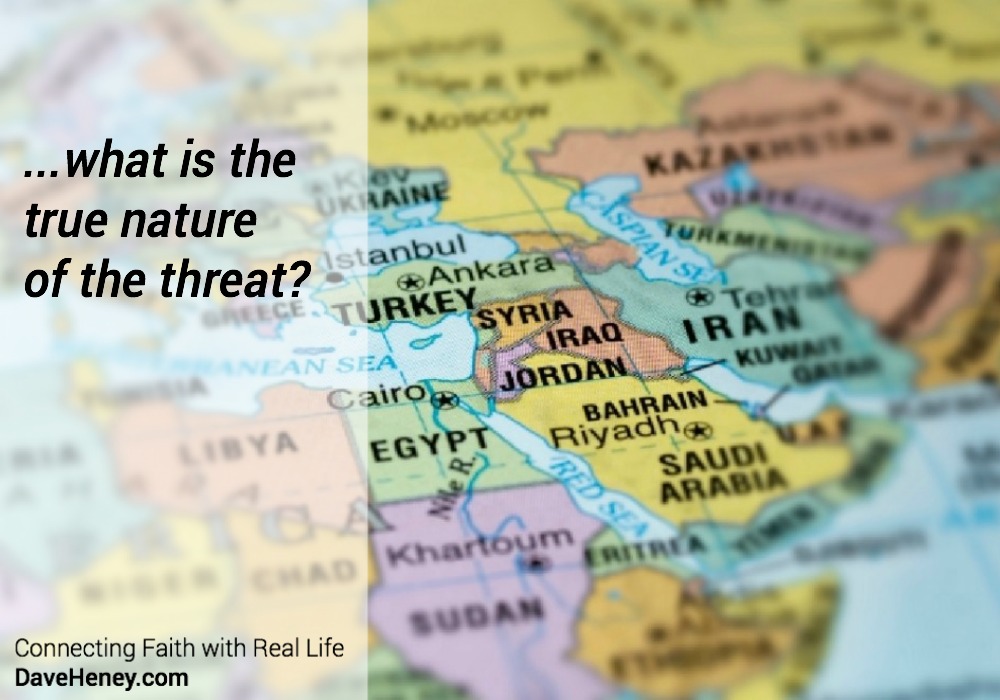
The Gospels place the birth of Jesus in the difficult historical events of First Century Palestine, when people suffered under violent terror of the Roman Empire. This year, we will celebrate Christmas with continuing violence of radical Islamic terrorists in the Middle East and around the world. How should we should we respond?
Jesus arrived as a baby in a very violent world and yet He affirmed the unconditional love God has for all people. Since God entered human history as a person, we understand that every person is “of God” and so worthy of respect, including ourselves. Therefore, we can never let another person harm us. While we always protect innocent human life from conception to natural death, terrorists are not innocent. If attacked, we have every right to protect the life we received from God. But how we face violence must affirm the dignity of both ourselves and our enemies. Because early Christians lived amidst violence they developed a way to protect their God-given life and also keep violence against others in check that is now called the “Just War Principles.”
They basically say our response to violence depends on the true nature of the threat. If the threat is small then our response is small, and not worth risking any soldier’s life. But if the threat is large, imminent, and deadly then our response can match it and may include military action using deadly force in self-defense. To the extent possible, our response must be intelligent, calmly reasoned, and directed only to stop aggression once and for all. This requires some wise and prudential judgment, so good and sincere people might disagree. The Just War Principles are summarized here:
JUST CAUSE: The threat must be a real, certain, immediate, and very dangerous enemy. If so, we can use force in self-defense to protect innocent life and basic human rights. Military force is to restore peace or stop deadly threats; and never for conquest, punishment, or revenge.
COMPETENT AUTHORITY: Our use of force must be carefully declared by those responsible for public order and never by private groups or individuals. More governments and wise people working together in coalitions are better than fewer, and a consensus within each nation is important.
LAST RESORT: All peaceful alternatives such as diplomacy and negotiations must be exhausted first, (based on the threat’s immediacy). The best battle is won without fighting at all!
PROBABILITY OF SUCCESS: There must be a strong chance that the end conditions are better than the start. We can’t make things worse, or destroy whole areas without helping to rebuild.
PROPORTIONALITY: The damage inflicted and the costs incurred must be proportionate to the good expected. We must limit aggression to stop or contain aggressors and spare innocent civilians. War ends only when the aggression ends.
How you view the threat determines your response.
If you believe Radical Islamic Fundamentalists are a worldwide movement of hundreds of groups that have and still seek the death of all unbelievers in the Middle East, Asia, Europe, and in America, then your response can include deadly force in self-defense. Moreover, if you believe terrorists seek government protection, weapons, and money, as Al Qaeda once did from the Taliban in Afghanistan and seeks again if the Taliban returns; and ISIS now has from holding vast amounts of Iraqi and Syrian land and financial resources, then the threat increases ten-fold.
If you believe terrorists are only local criminals then your response will be more of a local police action to quickly find, arrest, and try them in criminal courts as we normally do with extremely violent criminals. These are areas of prudential judgment so good people can disagree.
How is terrorism unique and how can we understand a “surge” of military force?
While armies conquer objectives like hills and valleys using conventional weapons, terrorists conquer minds using fear. While a conventional battleground is geographical, the terror battleground is your television screen and the perception of intimidating power that instant worldwide 24-hour cable news of terrorism makes possible. Horrific explosions that kill innocent children in marketplaces frighten local and even international viewers to surrender. Beheading journalists does the same. The western strategy that succeeded (beginning in 2007) in the Iraq War was to both forcefully confront terrorists and provide sufficient civilian security that will persuade local Arab Chieftains and their tribes to turn against terrorists and prevent the safe havens they use to prepare more attacks. This “surge” of forces used the perception of power to intimidate terrorists and convince local tribes and families to resist terrorism.
This strategy reflects the Catholic ideal of subsidiarity which affirms that moral actions should be taken by the lowest appropriate level of society; e.g. parents know they should not “take over” chores or homework that should be done by their children. In the same way, strengthening local populations who live among terrorists to defend their own country affirms subsidiarity. Whether this strategy works well or not is a matter of prudential judgment so good people can disagree.
What about compassion? “…turn the other cheek after being hit on the right?” (MT. 5:39)
Jesus understands that to slap another person’s right cheek with your right hand you must use a back hand slap, which is a gesture of insult to our dignity and not an actual physical attack. But Jesus affirms that our dignity comes only from God; no person can take it away, so Christians do not feel the slap as a wound at all and so no need for revenge. This is how Mahatma Gandhi changed the British Empire with non-violent civil disobedience. However, as Christians, we can voluntarily receive violence only if we believe there is a good chance our innocent suffering will inspire compassion in the other and so stop their aggression. While this was effective against Christian Great Britain, even Gandhi recognized it would not work against atheist Nazi Germany. In any event, Presidents are responsible for our safety and so cannot volunteer you or others to be Gandhi!
Courageous compassion is the strongest force in history. It compels us to rush into burning buildings to rescue innocent victims and even use force to restrain evildoers from doing harm to innocent people, as Jesus forcefully cleansed the temple (Jn. 2:12). Courage demands we do the right thing even when dangerous. Is there a more dangerous place for Our Lord to come than planet earth? Yet He arrives as a child with courageous compassion to reveal that every person is our brother and sister. We must stop terrorists precisely because we love them, and know that their use of terror is also not good for them. If we ever use force, it cannot be for punishment, revenge, or conquest. It must be as an absolute last resort, in self-defense and to stop people we love from causing even greater harm. Let our prayers for peace and our soldiers continue.
God Bless!
Fr. Dave


Thanks for these comments Fr Dave. I found them thought – provoking and in line with my current thought on this matter.
Thanks for your comments! Fr. Dave